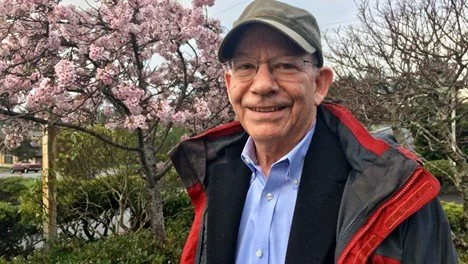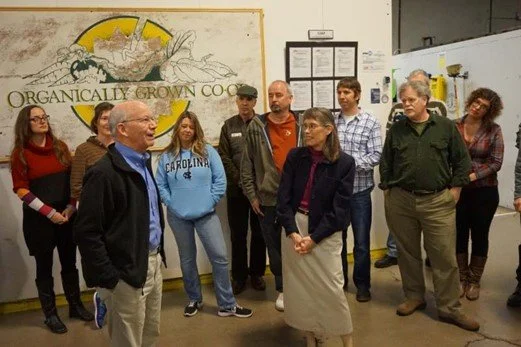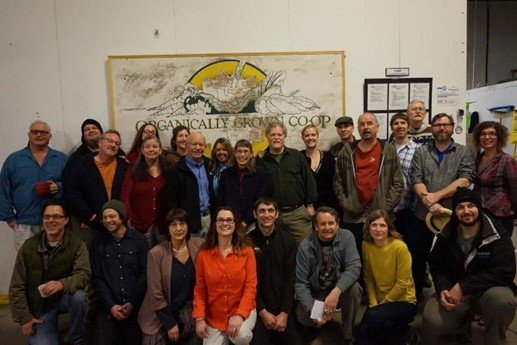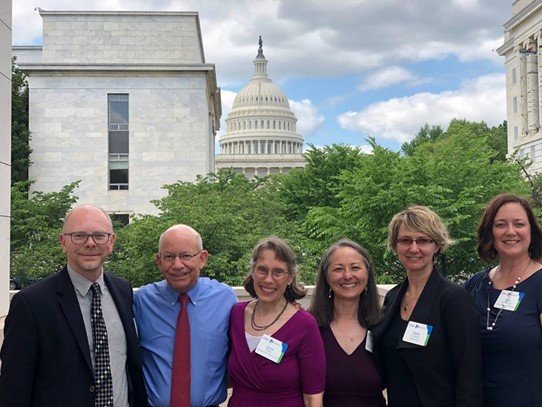Representative Peter DeFazio: An Organic Champion





By Lynn S. Coody, OGC’s Senior Policy Analyst
Last week, Representative Peter DeFazio announced that he is retiring from the US House of Representatives at the end of his current term.
He has tirelessly represented Oregon’s 4th District for 35 years as a feisty advocate for a wide range of topics from affordable health care, wilderness protection, and transportation safety. But for those of us who work in the organic trade, or who are consumers of organic foods, one action stands out above all—Peter DeFazio was willing to introduce, and fight for, the Organic Foods Production Act (OFPA) in the House of Representative, when no one else would consider doing so.
Standing for organic
In the spring of 1990, I was a part of a scrappy band of organic advocates from grassroots groups across the country who had managed to negotiate the text of the Organic Foods Production Act, testify before the Senate Agriculture Committee, and with the support of well-respected Senator Leahy of Vermont, get the bill through the US Senate. Then everything screeched to a halt.
The House of Representatives presented a very different challenge for the organic bill because the House Ag Committee was actively hostile to organics. There was not one Committee member willing to consider introducing the OFPA. Knowing that we would be facing an almost insurmountable disadvantage without any supporter on the House Ag Committee, the organic advocates nevertheless started looking for other Representatives who might be willing to introduce the bill. After the group worked through a lot of ideas for supporters without success, I suggested my own Oregon Representative, Peter DeFazio, and ran down a few points about why he might be open to supporting the bill, including his personal interest in organic production and his work as a staffer for our former Congressman, which had resulted in an earlier bill in support of farmers transitioning to organic. People listened, heads nodded, and I was instructed to make the ask to the Congressman.
I was able to get an appointment with Peter during his next trip home to his Eugene office. After I explained the main sections of the bill, I emphasized that we had no support from the Ag Committee. Without any hesitation, Peter agreed to introduce the bill into the House! However, his next words were to tell me, in detail, why the OFPA would not have an easy path through the House. Peter explained that not only was he not on the Ag Committee, worse than that, he also had very little standing as he was only in his first term in the House. He was certainly right about the difficulties! In fact, when he contacted Senator Leahy’s office to indicate his interest in being the House sponsor, Leahy’s aide, Kathleen Merrigan, said she appreciated his offer but preferred to wait a bit to see if the organic team could come up with anyone else who had more experience and sway. We couldn’t—so Peter stepped up to become the sponsor of the OFPA in the House.
In June 1990, the House Ag Committee took up the OFPA and voted it down emphatically. No surprise there. But what a blow; the OPFA would not be included in the Farm Bill. Most observers concluded that the OFPA’s trip through Congress had ended. But, not to be deterred, Freshman Congressman Peter DeFazio, offered to take it to the House Floor to re-propose OFPA as an amendment to the Farm Bill.
Back in Oregon, on a hot day in August, I was sitting at my desk at Organically Grown Co-op, doing brix tests on squashes and talking with growers about their field monitoring reports, when a call came through from a DeFazio staffer. “Come over to our office right away—Peter is going on the House floor with OFPA in a few minutes and there will be a vote on the OFPA right after that!” So I hopped in my car and arrived at DeFazio’s Eugene office in time to watch the proceedings on the C-Span channel with his staff. Peter’s speech was convincing and inspiring as he laid out the need for a national organic standard and for enforcement of the organic label to prevent fraud. When the vote began though, my heart sank because the tally looked like an absolute disaster, with the Republican block voting quickly and firmly against the OFPA. Seeing my distress, the staffers explained that the bill’s supporters would likely cast their votes later in the voting period. Sure enough. As more votes were cast, the tally slowly inched toward more “yays” than “nays.” When the voting period finally ended, the OFPA Amendment had passed 234 to 189!
Astonishingly, of all the bills that had been rejected by the House Ag Committee, OFPA was the only one to pass as an amendment and eventually be approved by Congress along with other provisions of the 1990 Farm Bill. This, thanks to the tenacity of the Congressman from Oregon, who would later go on to earn a reputation as a firebrand for his passionate support of issues, always including organics!
Continued and constant support for organic
During the ensuing decades, Representative DeFazio has been a constant campaigner for the integrity of the organic label, benefiting organic producers and consumers alike. He has been Co-chair of the House Organic Caucus since its inception in 2003. He authored many letters to the USDA to urge the agency’s implementation of strong and consistent organic standards. He has also actively supported Oregonians’ applications for a seat on the National Organic Standards Board.
In fact, whenever Congressional leadership was needed to address a new organic topic, the organic trade could count on Congressman Peter DeFazio to weigh in with his unique perspective, based on his longstanding experience and deep knowledge of organic issues.
Representative Peter DeFazio has taken the lead for decades on organic policy, always with the goal of advocating for directions that would allow organic farmers, handlers, and processers to prosper. When he retires from Congress in January 2023, his leadership will be sorely missed by many, but especially by those of us who have had the honor of working with him on organic policy issues over his decades as an important member of the organic community.
